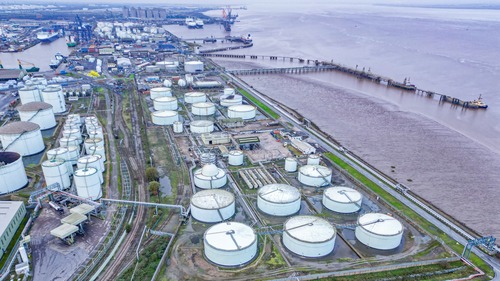Exolum to undertake world-first project to demonstrate the bulk transport and storage of Liquid Organic Hydrogen Carriers (LOHCs) in repurposed infrastructure in the Humber region, UK
Exolum will be the first company in the world to physically transport and store hydrogen through Liquid Organic Hydrogen Carriers (LOHCs) in commercial-scale, repurposed oil pipeline and tank storage infrastructure. Exolum and its project partners have secured the support of the UK Government, through public funding of £505,000 via Innovate UK, to carry out this innovative project at Exolum’s Immingham terminal in the Humber region. This is a major milestone in the company’s decarbonisation and diversification strategy, one of the objectives of which is to promote the development of hydrogen as an energy vector.
Organic liquid hydrogen carriers (LOHCs) are oil-like compounds that can absorb and release hydrogen through chemical reactions, and therefore LOHCs can be used as storage and transport medium for hydrogen. Previous projects have technically proven the processes required to attach and release hydrogen from LOHCs. Through this project, Exolum and its partners will demonstrate the only step in the LOHC process which has yet to be technically proven and demonstrated – its transport and storage in existing repurposed oil infrastructure.
The project is expected to be completed by the end of 2024 and will store and transport 400 cubic metres of LOHC, carrying around 20,000 kg of hydrogen (enough to drive a hydrogen passenger car around 2 million kilometres), between the Immingham East and Immingham West facilities via a 1.5 km pipeline. Laboratory testing will take place to confirm that the LOHC quality is maintained.
This project will allow Exolum to gain valuable information and insights into using its infrastructure for the transport and storage of LOHCs, a major step forward in the development and research of new storage and distribution technologies for new energy carriers, as well as a natural extension of its service offering.
Exolum’s infrastructure can already store and distribute multiple liquid products, so this offering is scalable and adaptable to support growth in market demand. The viability of this project will support the first hydrogen projects in the UK, making the crucial service of large-scale hydrogen storage and distribution available ahead of alternative options.
In addition to Exolum, as transport and storage infrastructure partner, this project involves Axiom, a British award-winning, multi-discipline engineering consultancy business who will design and manage the laboratory testing.
In the words of Felix Gomez, Technology and Innovation Lead: “At Exolum we are constantly working to accelerate the energy transition through the development of new logistics solutions for the energy carriers of the future. This project is a clear example of this and highlights the high potential of using existing energy infrastructure for new energy carriers”. Furthermore, Andres Suarez, Global Strategy & Growth Lead added that “Exolum has one of the most efficient and modern logistics system in the world, so its possibilities of use in the new energy transition scenario are highly realistic and have the potential to be game-changing”.
Exolum is firmly committed to the development of projects related to green hydrogen and its derivatives for both industrial use and mobility. In Spain, the company has completed construction of the first integrated green hydrogen production and dispatch plant for mobility in the Community of Madrid. It is also building a green hydrogen production plant and refuelling station at its Riverside terminal, located in Stockton-on-Tees (United Kingdom), as part of the “Tees Valley Hydrogen Vehicle Ecosystem” project. Similarly, the company has acquired 50% of the world’s leading ammonia and NGL storage facility in Houston, USA, which is currently developing one of the world’s most advanced low-carbon ammonia production and export projects.
Likewise, and in collaboration with other companies and research centres, Exolum participates in other projects that aim to promote the development of new energy vectors by taking advantage of existing infrastructures, researching storage and distribution technologies for hydrogen of renewable origin in LOHCs, such as the Regenera and GreenH2Pipes consortiums, and HSL Technologies, a French start-up focused on the development for the creation of simple, efficient, innovative and economical methods for transporting and storing hydrogen.
Latest news
UPM receives triple sustainability certification for the Leuna biorefinery
Leuna Chemical Complex →The Leuna biorefinery is the world’s first industrial-scale facility of its kind, converting wood into advanced biochemicals at scale. This milestone reinforces UPM’s role as a frontrunner in susta...
On stream: BASF starts up new world-scale plant for hexamethylenediamine in Chalampé, France
Increase of BASF’s HMD production capacity to 260,000 metric tons Expansion of polyamide business together with polyamide 6.6 production in Freiburg
BASF starts commercial operation of Black Mass plant for Battery Recycling in Schwarzheide, Germany
It is one of the biggest commercial Black Mass plants in Europe, with an annual processing capacity of up to 15,000 tons of end-of-life lithium-ion batteries and production scrap. This equals rough...
Clariant's ShiftMax™ 100 RE catalyst powers INERATEC´s groundbreaking e-Fuels plant at Frankfurt Höchst
Industriepark Höchst →Clariant supplies its innovative ShiftMax 100 RE catalyst for INERATEC's first commercial-scale e-Fuels plant in Industry Park Hoechst, Germany. The catalyst enables efficient conversion of green h...

